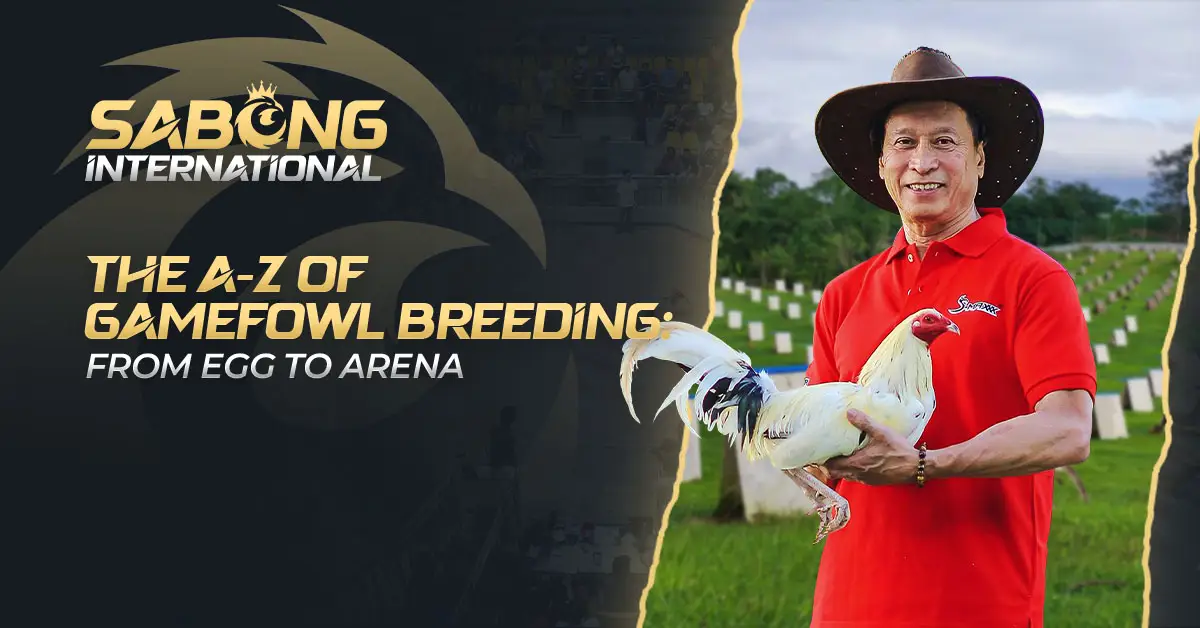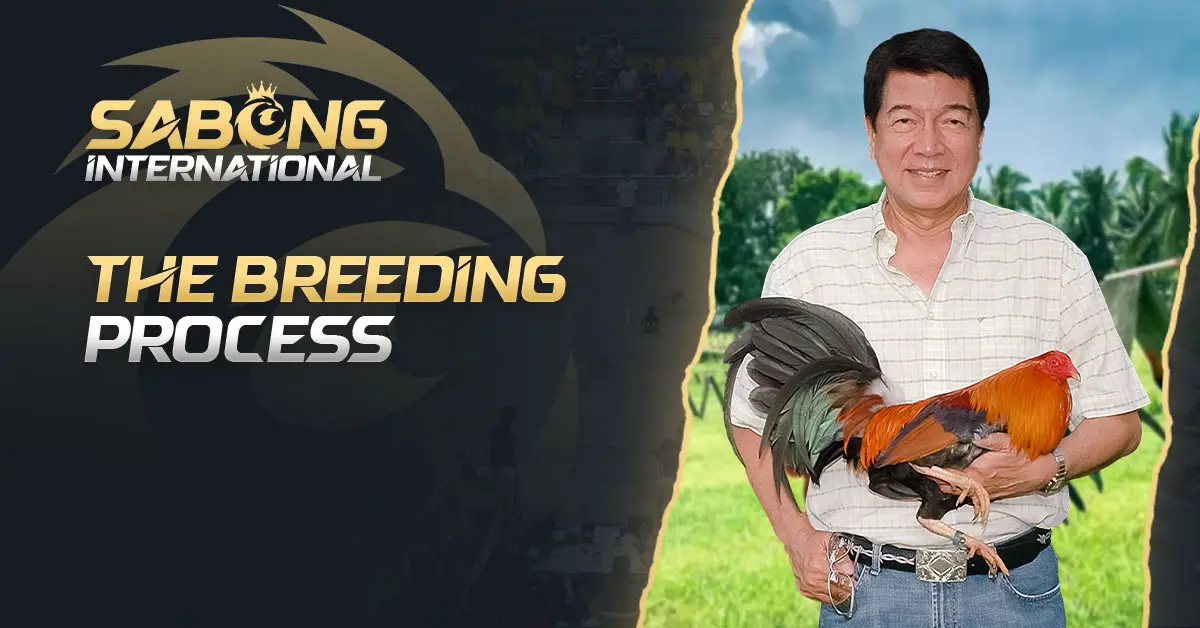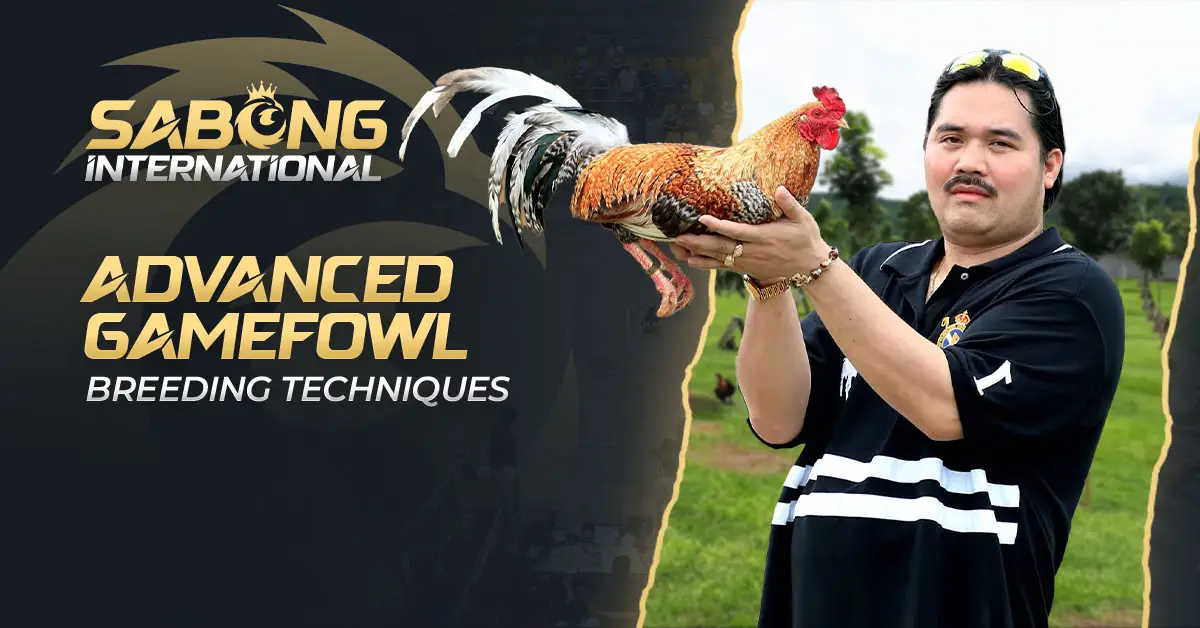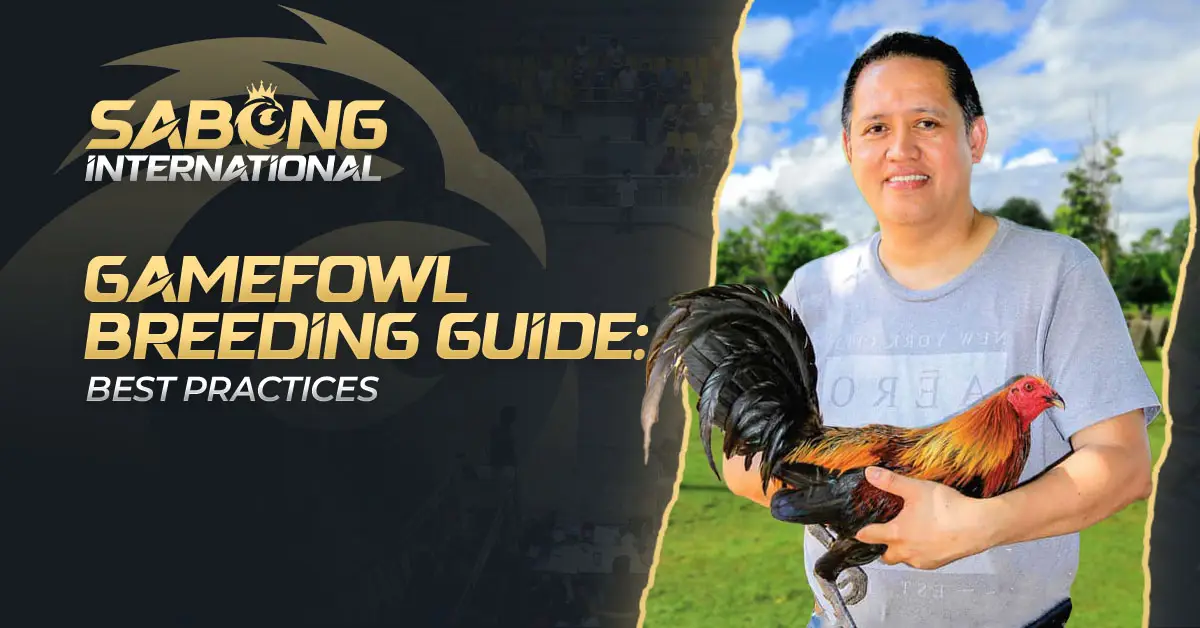The A-Z of Gamefowl Breeding: From Egg to Arena

Gamefowl breeding is a meticulous art that combines tradition, science, and passion, deeply rooted in the cultural fabric of sports like sabong.
This comprehensive guide delves into the essence of breeding gamefowl, from the foundational genetics to the competitive arena of sabong, providing a step-by-step approach to raising champion birds.
With a focus on ethical practices, this guide serves as an indispensable resource for both novice and experienced breeders who are passionate about the heritage and future of gamefowl competition.
Understanding Gamefowl Breeding
What is Gamefowl Breeding?
Historical Context and Significance
- Origins: Gamefowl breeding has roots in ancient cultures, where these birds were revered for their vigor and beauty.
- Cultural Impact: Over centuries, the practice has evolved, yet it remains steeped in tradition and cultural significance.
Role in Performance
Pre-Breeding Considerations
Setting Breeding Objectives
- Traits: Identify the traits you wish to enhance or introduce in your breeding program.
- Standards: Set standards for health, conformation, and behavior.
Gamefowl Genetics and Heredity
- Basics: Familiarize yourself with basic gamefowl genetic principles to make informed breeding decisions.
- Predictability: Understand how heredity affects the predictability of traits in offspring.
Selecting Breeding Stock
- Quality: Choose birds with the best qualities from reputable sources.
- Health: Ensure that the birds are healthy and free from genetic defects.
Health and Nutrition
- Diet: Provide a balanced diet that supports reproductive health.
- Supplements: Consider supplements that may enhance fertility and vitality.
The Breeding Process

A. The Breeding Setup
Choosing the Right Environment
- Space: Ensure adequate space for mating pairs or groups.
- Safety: Create a safe and stress-free environment to encourage successful mating.
Necessary Equipment and Facilities
- Nesting Boxes: Provide comfortable and clean nesting boxes for egg-laying.
- Incubators: Have reliable incubators ready for egg incubation.
B. Mating Strategies
Pair Mating vs. Pen Mating
- Pair Mating: Involves one rooster and one hen, allowing for precise pedigree control.
- Pen Mating: Involves one rooster with multiple hens, which is less controlled but more efficient.
Timing and Frequency of Mating
- Season: Understand the best breeding season for gamefowl.
- Frequency: Determine the optimal frequency of mating to ensure high fertility rates.
C. Egg Handling and Incubation
Collecting and Storing Eggs
- Collection: Gather eggs frequently to maintain their viability.
- Storage: Store eggs at the correct temperature and humidity before incubation.
Incubation Best Practices
- Temperature: Maintain a consistent temperature within the incubator.
- Humidity: Monitor and adjust humidity levels to ensure proper embryo development.
Monitoring Embryo Development
- Candling: Use candling techniques to check embryo development.
- Intervention: Know when and how to intervene if an embryo is not developing correctly.
From Hatchlings to Fledglings
A. Hatching and Early Care
Managing the Hatching Process
- Observation: Keep a close eye on the hatching process to assist if necessary.
- Assistance: Know how to safely assist a chick that is struggling to hatch.
Brooding Requirements
- Heat: Provide a consistent heat source to maintain optimal brooding temperatures.
- Space: Ensure there is enough space for all chicks to access heat, food, and water.
B. Chick Management
Feeding and Nutrition for Growth
- Starter Feed: Offer a high-quality starter feed to support rapid growth.
- Feeding Schedule: Establish a feeding schedule that meets the nutritional needs of growing chicks.
Health Monitoring and Vaccinations
- Check-ups: Conduct regular health check-ups to catch any issues early.
- Vaccination Program: Follow a vaccination program to prevent common poultry diseases.
C. Rearing Young Gamefowl
Training and Conditioning
- Exercise: Introduce age-appropriate exercises to build strength and stamina.
- Conditioning: Start conditioning early to prepare for future training.
Socialization and Handling
- Human Interaction: Handle chicks regularly to promote tameness and reduce stress.
- Social Skills: Allow young gamefowl to interact with each other to develop social skills.
Advanced Gamefowl Breeding Techniques

Line Breeding, Inbreeding, and Crossbreeding
- Line Breeding: Strengthen specific traits by breeding closely related birds.
- Inbreeding: Use with caution to fix traits but be aware of the risks.
- Crossbreeding: Introduce new traits and vigor by breeding different lines or breeds.
Genetic Diversity and Hybrid Vigor
- Diversity: Maintain genetic diversity to prevent health issues associated with inbreeding.
- Hybrid Vigor: Understand how crossbreeding can result in offspring with enhanced qualities.
Record-Keeping and Pedigree Analysis
- Records: Keep detailed records of matings, hatchings, and offspring performance.
- Analysis: Use pedigree analysis to make informed breeding decisions.
Preparing for the Arena
A. Conditioning for Competition
Physical and Mental Conditioning
- Training Regimen: Implement a training regimen that gradually increases in intensity to build the birds’ endurance and strength.
- Mental Toughness: Engage in activities that enhance the birds’ mental resilience and fighting spirit.
Diet and Supplements
- Nutritional Requirements: Tailor the diet to meet the heightened nutritional requirements during conditioning.
- Supplements: Consider supplements that support muscle development and energy levels.
B. Understanding Gamefowl Behavior
Aggression and Competition Behavior
- Natural Instincts: Recognize and respect the natural instincts and behaviors of gamefowl.
- Behavioral Training: Use behavioral training to manage aggression and enhance performance.
Stress Management
- Environment: Create a calm environment to minimize stress during training.
- Routine: Establish a consistent routine to provide stability and security for the gamefowl.
C. Legal and Ethical Considerations
Navigating Laws and Regulations
- Legislation: Stay informed about the laws and regulations affecting gamefowl breeding and competitions in your region.
- Compliance: Ensure that all breeding and competitive practices are in full compliance with legal standards.
Ethical Considerations
- Animal Welfare: Prioritize the health and welfare of your gamefowl at all stages of breeding and training.
- Sporting Integrity: Uphold the integrity of the sport by adhering to ethical breeding and competition practices.
Gamefowl Breeding Guide: Best Practices

Comprehensive Breeding Calendar
- Seasonal Planning: Develop a breeding calendar that takes into account the seasonal nature of gamefowl reproduction.
- Lifecycle Events: Schedule important lifecycle events, such as vaccinations, health checks, and conditioning.
Health and Wellness Checks
- Regular Examinations: Conduct regular health examinations to catch and address any issues promptly.
- Veterinary Support: Establish a relationship with a veterinarian who is experienced in gamefowl health.
Troubleshooting Common Breeding Issues
- Fertility Problems: Learn to identify and address common fertility problems in gamefowl.
- Hatchability: Implement strategies to improve egg hatchability rates.
Conclusion
The journey from egg to arena is a complex and rewarding process that requires dedication, knowledge, and a deep respect for the gamefowl. By following this Sabong International comprehensive guide, breeders can enhance their breeding programs, raise healthy and competitive gamefowl, and contribute to the rich tradition of the sport.
As the practice of gamefowl breeding continues to evolve, it is the responsibility of the breeding community to ensure that it does so with an unwavering commitment to ethical and sustainable methods.
The future of gamefowl breeding lies in the hands of those who are willing to uphold these standards and pass on their knowledge to the next generation of breeders.
Appendix
Glossary of Gamefowl Breeding Terms
- Broodcock: A rooster used for breeding purposes.
- Broodhen: A hen used for breeding purposes.
- Candling: A method used to observe the growth and development of an embryo inside an egg.
- Spur: A sharp, horn-like structure on the leg of a gamefowl.
Resource List for Gamefowl Breeders
- Breeding Supplies: List of suppliers for breeding equipment and nutritional products.
- Veterinary Services: Directory of veterinary services specializing in gamefowl.
FAQs
The ideal age for gamefowl to start breeding typically depends on the breed, but generally, hens are ready to breed when they are about 6-8 months old, as soon as they start laying eggs consistently. Roosters are often ready to breed by 8-10 months when they reach sexual maturity and show interest in hens.
However, for optimal genetic quality and vigor, many experienced breeders prefer to start breeding roosters that are at least one year old to ensure they have fully developed their secondary sexual characteristics and behaviors.
To determine if an egg is fertile, you can use a process called candling. This involves shining a bright light source behind the egg to see inside the shell. In fertile eggs, you'll typically see a network of blood vessels emerging from a dark spot (the blastoderm) as early as 3-4 days into incubation.
In contrast, infertile eggs will just show a clear yolk and no blood vessels. It's important to candle eggs in a dark room for the best visibility and to handle the eggs gently during the process.
A healthy gamefowl chick will be active and alert, with bright, clear eyes and a clean, dry navel area. It should have a good appetite, be vocal, and show consistent growth. The chick's feathers should begin to come in evenly, and it should be able to stand and walk without difficulty.
Additionally, healthy chicks will have well-formed, consistent droppings and should not show signs of distress such as lethargy, labored breathing, or excessive peeping.


